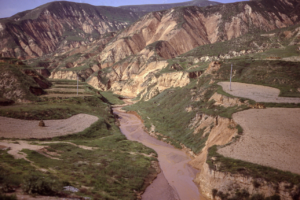
Terraced fields of the Loess Plateau in Inner Mongolia, China. Photo by Robert_Ford/Getty Images
‘Our Biggest Challenge? Lack of Imagination’: The Scientists Turning the Desert Green
In recent years, discussion about the climate crisis has predominantly focused on fossil fuels and greenhouse gases; now, we’re coming to realize that the other side of that coin is protecting and replenishing the natural world.
By Steve Rose, The Guardian, March 20, 2021
Tiers Van der Hoeven is a co-founder of the Weather Makers, a Dutch firm of “holistic engineers” with a plan to regreen the Sinai peninsula – the small triangle of land that connects Egypt to Asia.
Within a couple of decades, the Weather Makers believe, the Sinai could be transformed from a hot, dry, barren desert into a green haven teeming with life: forests, wetlands, farming land, wild flora and fauna.
A regreened Sinai would alter local weather patterns and even change the direction of the winds, bringing more rain, the Weather Makers believe – hence their name.
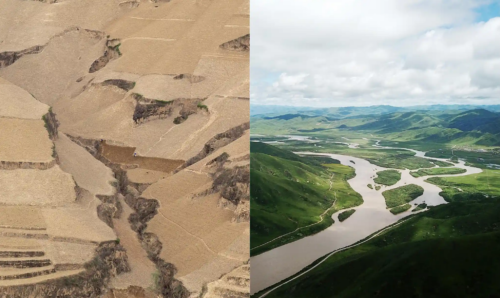
The Loess plateau, in China, in 2007, left, and transformed into green valleys and productive farmland in 2019. Composite: Rex/Shutterstock/Xinhua/Alamy
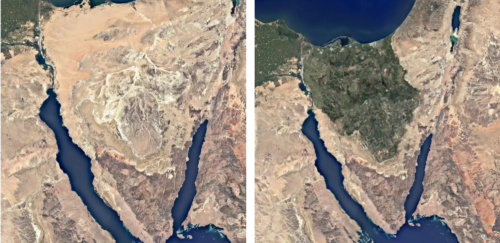
The Sinai peninsula today, and how it could look after regreening. Composite: The Weather Makers
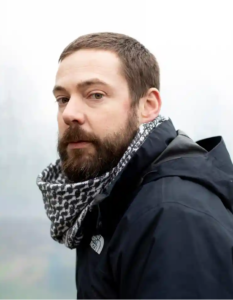
Ties van der Hoeven: ‘If we want to do something about global warming, we have to do something about deserts.’ Photograph: Judith Jockel/The Guardian
Van der Hoeven is nothing if not persuasive. Voluble, energetic and down-to-earth, the 40-year-old engineer’s train of thought runs through disciplines from morphology to esoteric mysticism, often threatening to jump the tracks. But he is keenly focused on the future.
“This world is ready for regenerative change,” he says. “It’s going to be a complete change of our behaviour as a species in the longer term. It is going to be a step as big as fire was for humanity.”
It sounds impossibly far-fetched, but not only is the Weather Makers’ plan perfectly feasible, they insist, it is precisely the type of project humanity should be getting its head around right now.
In recent years, discussion about the climate crisis has predominantly focused on fossil fuels and greenhouse gases; now, we’re coming to realise that the other side of that coin is protecting and replenishing the natural world.
There is no better mechanism for removing carbon dioxide from the atmosphere than nature, but in the past 5,000 years, human activity has reduced the Earth’s total biomass by an estimated 50%, and destroyed or degraded 70% of the world’s forests.
As UN secretary general António Guterres put it last year: “Human activities are at the root of our descent toward chaos. But that means human action can help to solve it.”
The Weather Makers know this very well: their origins are in dredging, one of the heaviest industries there is.
Over the past few centuries, dredging has helped humans alter the face of the planet on ever-greater scales.
Trained as a morphological engineer, Van der Hoeven has spent the past decade in the industry, working on projects across the world, including the artificial islands of Dubai, whose creation involved large-scale dredging and land reclamation. He got sucked into the expat lifestyle there, he admits: drinking, eating, partying, “I lost a little bit of my soul.”
Returning to the Netherlands in 2008, he began to reexamine his own profession: “What I could see is that the dredging industry had so much potential; we were just misusing it.”
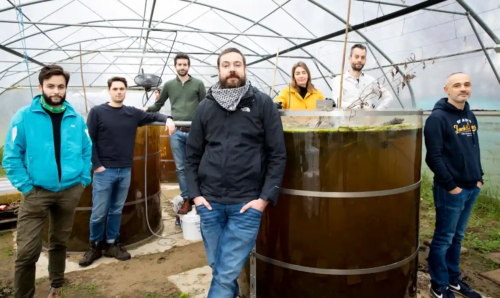
The Weather Makers, from left, in their eco machine: Eduardo Vias Torres, Pieter van Hout, Maarten Lanters, Ties van der Hoeven, Maddie Akkermans, Gijs Bosman, Mohammed Nawlo. Photograph: Judith Jockel/The Guardian
Working for the Belgian company Deme, he devised a new method of dredging that was both more eco-friendly and more efficient.
He used inexpensive sensors to model maritime conditions in real time – waves, currents, tides – so as to determine more precisely where and when it was safe to work.
Trialing the system, he won over sceptical colleagues by living on the vessel with them, even cooking meals. Head office was also convinced when his technique saved a small fortune.

